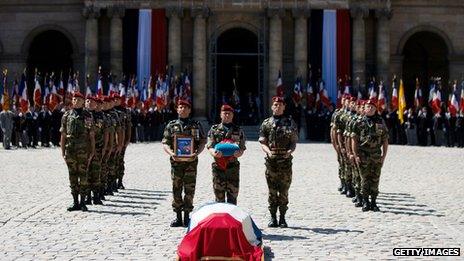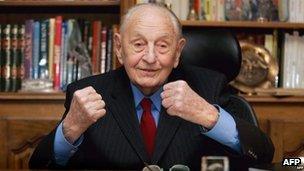French General Bigeard laid to rest after posthumous battle
- Published

The death of General Bigeard was marked in a ceremony in 2010
The remains of one of France's most decorated generals, Marcel Bigeard, will finally be interred on Tuesday, following bitter wrangling in the two years since his death.
The funeral in the Indochina War Memorial at Frejus, in the south of France will be attended by his daughter and France's Defence Minister, Jean-Yves Le Drian.
But opinions remain divided over General Bigeard, who is accused of overseeing torture during France's war with Algeria.
Previous attempts to find him a resting place have failed because of his controversial past.
Now his detractors are outraged that the French government will officially recognise his burial. They launched a petition, external calling for Mr Le Drian to stay away from Tuesday's ceremony.
The Human Rights League in Toulon said if Mr Le Drian were to praise Gen Bigeard in the ceremony, "it would amount to elevating torture to a military discipline worthy of being honoured by the state".
But his supporters say the ceremony is a fitting memorial for a soldier who rose from the lowest rank when he enlisted in 1936 to end his career as a lieutenant-general.

Torture was "a necessary evil" claimed Marcel Bigeard
When war was declared in 1939, Marcel Bigeard was stationed on the Maginot Line in Hoffen. He was captured by the Germans but escaped to Africa where he joined the Free French Army.
After training in Britain, he was parachuted back into France in 1944 to lead the Resistance in the department of Ariege in the Pyrenees, winning medals for his bravery and promotion to captain.
After the war he was dispatched to French Indochina, where he established his reputation with a parachute battalion, particularly in the defence of Dien Bien Phu.
He was captured when that garrison fell in 1954, but returned home three months later, now promoted to colonel.
His final active service was in Algeria, where he was awarded the nickname of "Lord of the Atlas Mountains" by his commanding officer for his feats against rebels fighting for independence in 1957.
But he, and other senior commanders, have admitted to the widespread use of torture in the campaign. In an interview with Le Monde newspaper, General Bigeard called it a "necessary evil" which had helped save French lives.
Beaten daily
Louise Ighilahriz says she was visited by Gen Bigeard while she was tortured by the French military in Algeria in 1957.
After her arrest as a 20-year-old, she was kept naked for three months and beaten daily.
"They could come one, two or three times a day. As soon as I heard the noise of their boots, I began to tremble."
"Then, time was endless. Minutes seemed to last hours, hours days."
"The worst was the first few days, getting used to the pain. After that one seemed to become detached from one's body."
She says she only survived thanks to the intervention of a French medical officer, who took her to hospital for treatment.
Her account, told to Le Monde newspaper in 2000, sparked a debate about the role played by senior French officers.
Le gegene
General Bigeard denied the allegations, calling them "a pack of lies".
He says he was never personally involved in the practice of torture. But he says he knew about the use of the gegene, an electric generator that was attached to prisoners' genitals.
He told Le Figaro newspaper in 2000 that the device was useful for loosening tongues and securing information which could save lives.
But two years after his death, Mrs Ighilahriz says that his failure to admit the full extent of his role in Algeria made him unworthy of state honours.
"He should have confessed to his crimes before he died. That he didn't deeply disappoints me."
The petition she signed claims: "The name of Bigeard is synonymous with the most detestable practices of the French Army."
But the chairwoman of the General Bigeard Foundation, lawyer Anne-Marie Quenette, said: "I am outraged that people should dispute the right of a soldier of his stature to rest among his comrades."
The decision has also been widely welcomed by veterans writing in a military blog.
It puts an end to fierce arguments over his resting place.
His desire for his ashes to be scattered at Dien Bien Phu, so that he might lie with his fallen comrades, was refused by the Vietnamese government.
Then, a government decision to inter him in Les Invalides in Paris, where French war heroes have been buried since the 17th century, was reversed because of public outrage.
No final decision was then made until September, when Mr Le Drian announced that Gen Bigeard would finally be buried in the Indochina memorial in Frejus.
- Published18 June 2010
- Published27 July 2010